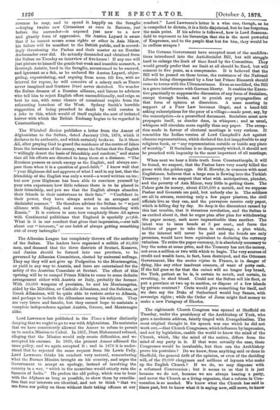When next we hear a little truth from Constantinople, it
will be found, we suspect, that the Pashas have very nearly killed the goose with the golden eggs. Sir E. Hornby, in common with most Englishmen, believes that a large sum is flowing into the Turkish Treasury ; but we suspect that what with anticipations, plunder, and the poverty of Asia Minor, very little is getting there. The Palace gets its money, about £150,000 a month, and we suppose Pashas and Generals are paid, but nobody else is. The soldiers are all in arrears, receiving only a few paper piastres, the civil officials live as they can, and the purveyors receive only paper, which is falling day by day. So deep is the discontent caused by this last trouble, that it threatens revolution, and the Sultan is as excited about it, that he urges plan after plan for withdrawing the paper money, each more impracticable than another. The latest was to issue bonds at 8 per cent., and force the holders of paper to take them in exchange, a plan which, as the interest will never be paid and the bonds are only promises, would have been equivalent to declaring the currency valueless. To retire the paper currency, it is absolutely necessary to buy the notes at some price, and the Treasury has not the money, not even a million or two with which to begin. The very sources of credit and wealth have, in fact, been destroyed, and the Ottoman Government, like the ancien regime in France, is in danger of dying, like any other insolvent concern, of want of petty cash. If the fall goes so far that the cairn& will no longer buy bread, the Turk, patient as he is, is certain to revolt, and certain, in revolting, to shed blood. Could not the Sultan sell his fleet, or put a province or two up to auction, or dispose of a few islands by private contract? Crete would give something for itself, and we dare say the Duke of Sutherland would buy Samos, with sovereign rights ; while the Order of Jesus might find money to make a new Paraguay of Rhodes.


































 Previous page
Previous page